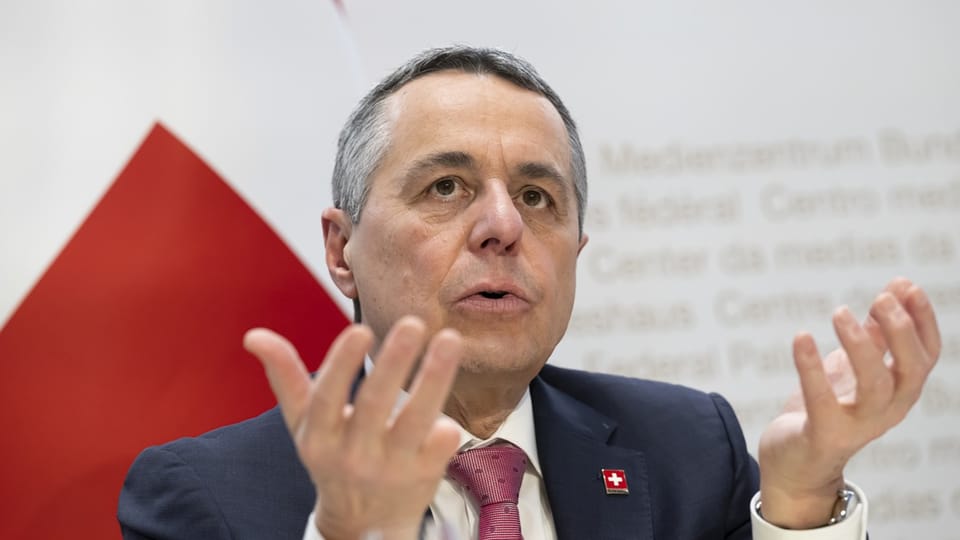Ignazio Cassis remains foreign minister – and presents a draft for negotiating guidelines with the EU. In the interview he says which improvements he is particularly proud of in the EU negotiations, where there is still a need for discussion and how Winterthur hip prostheses can be sold directly in Lisbon.
SRF News: Ignazio Cassis, did you remain foreign minister because you are so happy with what you have achieved in Brussels?
Ignazio Cassis: I am still Foreign Minister and I wanted to continue to work on this issue because I consider it my institutional responsibility to bring this issue to a happy end.
What are you particularly proud of?
The fact that in the second attempt we had the discussion in Switzerland right from the start, a good domestic political discussion with the cantons and the social partners. We don’t agree on everything, but we work together, and that is reflected in the strengthening of our position vis-à-vis the European Union.
In terms of foreign policy, we have already defined a good security mechanism, but that is still not enough.
I am proud that we now have a broad package approach and, above all, that we are building on the bilateral path, and not a framework, a horizontal path, like last time.
What is the best thing you have achieved in terms of content?
Today we have clarity about which health and electricity cooperation and which institutional solution is specifically feasible. But above all, the free movement of people continues to be a freedom of workers and not of Union citizens.
With regard to the internally controversial wage protection, you achieved that if the wage protection rules in the EU became worse, we would not have to adopt them. Nevertheless, the unions are not satisfied, nor is the SVP anyway. How do you want to achieve political majorities like this?
We have only taken half a step. On the foreign policy side, we have already defined a good security mechanism, which is also recognized in domestic policy. But that is not enough to provide the security that is needed. That is why we will now negotiate on the foreign policy side and continue the discussion with the social partners.
The social partners are in discussions, but nothing solid has been heard from them yet. Would it now be time for the Federal Council itself to make concrete proposals?
Our goal would be for the social partners to come to an agreement step by step. If they don’t achieve their goal, the federal government said a year and a half ago, then it will decide. The Federal Council is in the lead.
But you don’t yet have any concrete ideas about what could be done to improve wage protection?
There are many concrete ideas that we have been discussing with the social partners and the cantons for months.
Our prosperity depends on the fact that our economy can also export in this European internal market.
A criticism from the unions, but also from employers: When it comes to expenses, Polish workers in Switzerland, for example, are only paid according to Polish standards. That would also be a form of wage dumping.
That’s right. It is precisely this element of the expense regulation that is still being discussed today, both in terms of foreign and domestic policy.
The other criticism, from the right: Switzerland’s sovereignty is at risk if EU law has to be adopted and the so-called foreign judges play a major role. What do you say?
That it is Switzerland’s wish to adopt EU law in those areas where we have participation in the internal market. We are happy when we can produce our hip prostheses in Winterthur and sell them directly in Lisbon or Berlin. And that this is guaranteed without them having to be certified five times.
But people may not agree with this everywhere.
The economy already plays a big role. Our prosperity depends on the fact that our economy can also export in this European internal market. One out of every two francs in Switzerland depends on our exports. And in the uncertain world around us, our relationships with neighboring countries are extremely important.

Legend:
At the media conference, Federal Councilor Ignazio Cassis spoke about the new “Draft Negotiating Guidelines”: the result of the exploratory talks with the EU over the last few months. (Image: December 15, 2023)
KEYSTONE / Anthony Anex
There are not only EU rules on the economy, but also on immigration, for example. There, the SVP fears that it will have to adopt rules that it doesn’t like.
It is an important objective for the Federal Council to no immigration into social security. That was a guiding principle in the preparation. We have taken very concrete steps here, together with the cantons, which are then responsible for controlling immigration.
In the end, the decision will probably be made at the ballot box. Are you still in office then?
I hope that we can do it quickly enough so that I am still in office and can accompany this referendum.
The interview was conducted by Nathalie Christen.
